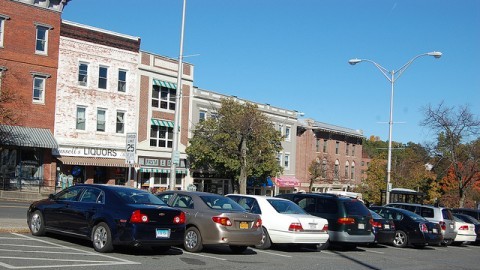While some locations in downtown Amherst temporarily closed their doors, others have adapted their physical spaces and standard operations to serve customers in new ways.
Since students were sent home due to COVID-19 last semester, Amherst’s downtown businesses have suffered due to abrupt loss of student activity. Some locations, such as Johnny’s Tavern, have “stayed open through the whole pandemic,” according to Nathan Yee, the restaurant’s assistant general manager.
Yee attributed his location’s endurance to its character as a “family restaurant” rather than a student hotspot, suggesting that the lack of students on campus hasn’t permanently damaged business. Currently, the restaurant is using plexiglass barriers between booths and placing tables six feet apart to allow for indoor dining.
Judie’s Restaurant temporarily closed their doors and have announced no plan to reopen. Their website reads “Judie’s will be closed until further notice” and their Facebook page dates this decision back to March 15.
“Downtown is doing the best it can considering the circumstances” even though bars like “SPOKE, McMurphy’s and Stacker’s” are “taking longer to open back up,” said Yee.
The bar scene in Amherst remains at a standstill. However, there have been small yet promising steps toward normalcy.
Bistro 63, which includes Monkey Bar, has opened its doors for “Bar Nights,” which owner Rasif Rafiq unveils “may look extremely different” than a conventional bar experience. During Bar Nights, which take place on weekends, customers are offered an altered menu of cocktails and pub fare, Rafiq explained.
“Guests can make reservations for tables of up to six,” he said. “They can sit with their friends and order some fries, grilled bread, or a Monkey Pie, if they’re looking for a sweet chocolate dessert.”
Remaining observant of social distancing guidelines, Rafiq admitted that “it’s not Monkey Bar, but it gives people something to do on weekend nights.”
As for a return to full-scale business operations, Rafiq said that “we don’t see that [the nightclub is] coming back until it’s safe to do so.” He said, “since day one [of the pandemic], we’ve done everything the state has allowed people to do.”
Bistro 63 has focused on cuisine “more conducive to takeout,” items such as to-go cocktails, for one, have “really taken off amongst students,” according to Rafiq. “You can enjoy some nicely-made bistro cocktails and enjoy them at a picnic,” he added.
Although the pandemic has placed a strain on Amherst’s bars and restaurants, Rafiq said he is appreciative of the progress that the town has made thus far.
“The town and the businesses have worked hard together for the last six months to get where we are now,” he said.
Rafiq said Bistro 63 and Monkey Bar will “continue to provide a safe environment for people to come out” during the pandemic. He hopes that the Amherst community will “do some of the things that they used to enjoy [before the pandemic].”
Echoing a similar sentiment, Joe Deng, owner of LimeRed Teahouse, said “the businesses that will survive are the ones that can adapt to new circumstances,” which what he said he is trying to do at his three bubble tea cafe locations. At his Amherst location, Deng described a bubble tea experience that is “more like a supermarket walkthrough” than a “sit-down experience” in order to keep customers safe.
In his new system, customers place their orders and wait in a three-person queue at the counter to limit human contact. To further protect customers, there are no chairs or tables in the building so sitting down is not an option. Deng commented that part of the bubble tea experience is “hanging out and you can’t do that anymore” due to restrictions.
Another major change, he said, was “replacing cashiers with an automated kiosk” to limit human contact. Although he “lament[s] the loss of that job,” he said he realizes that the customer must always come first.
“If you don’t have the safety of your customers in mind, I don’t know who would want to go” to your eatery, Deng said.
Aidan Poole can be reached at [email protected]. Follow him on Twitter at @aidanmpoole.
Cameron Gibney can be reached at [email protected]. Follow him on Twitter at @HayesGibney.



















